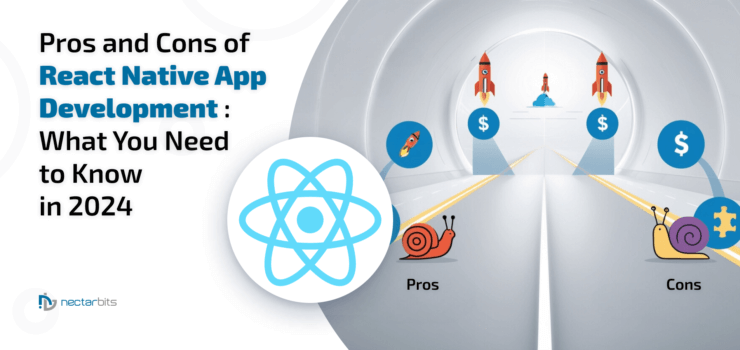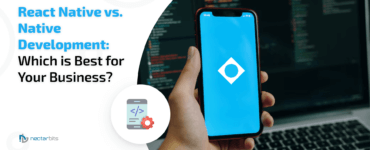React Native is a powerful tool in the developer’s arsenal that allows them to quickly build high—quality apps for iOS and Android platforms. The open-source framework, originally built by Facebook a decade ago, is gaining popularity as a cross-platform development tool. Investing double the efforts, time, and dollars for publishing the same apps on different platforms sounds inefficient, so the world is showing more interest in the React Native app development services.
Why Choose React Native for mobile app development?
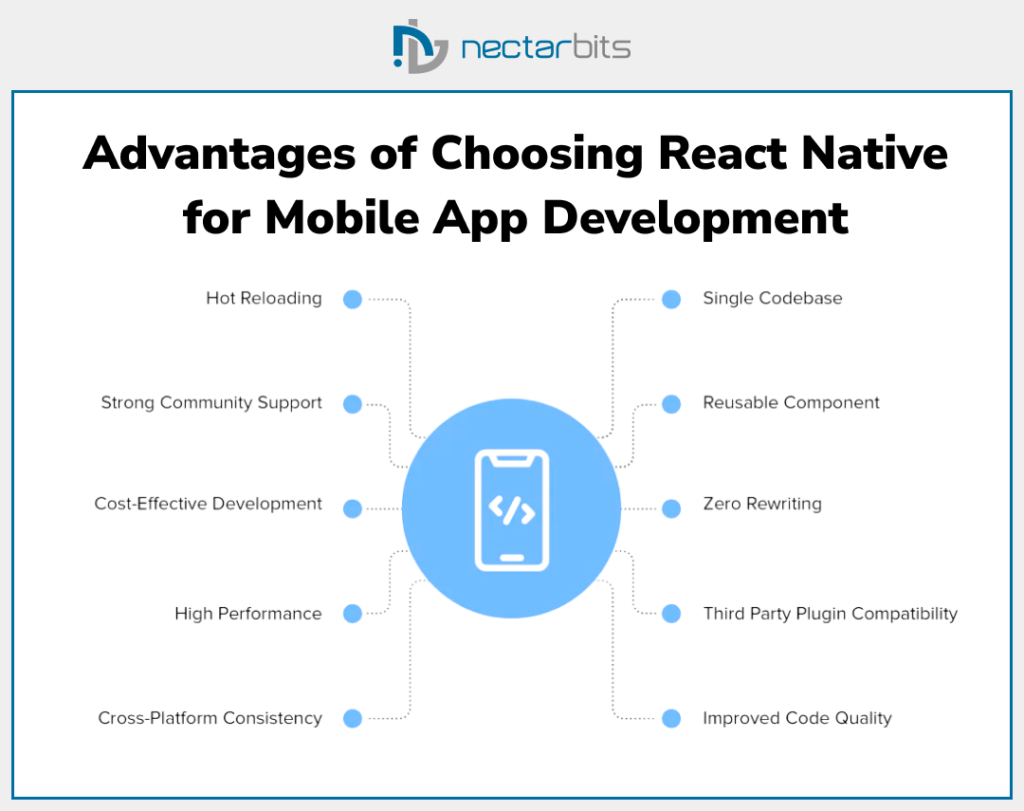
Offering a unique cross-platform solution that makes the development process more efficient and cost-effective, React Native is truly a next-generation development framework. The salient benefits provided by React Native development have enticed a large community of developers globally to adopt the language for their software development and maintenance.
Here are some of the best features within React Native that continually drives its popularity:-
Take App Performance to the Next Level
The apps engineered using React Native may not perform at the speed that native apps render. However, React Native app performance can be boosted by optimizing the app with native code, where specific features are built using native code. A notable example is Walmart, which refashioned its app using React Native technology to ramp up performance.
Read More:- Successful Companies Using React Native Apps in 2024
Intuitive UI That Catches Maximum Eyeballs
The React Native framework is more like a JavaScript library that simplifies creating mobile UI. Your decision to hire a React Native app developer can pay itself as the framework minimizes load time, is highly responsive, and works seamlessly. Additionally, the pre-built UI-specific declarative components for various platforms facilitate native-like UI development for Android and iOS mobile applications.
Accelerate Mobile App Development
React Native app development services offer a range of pre-built components that eliminate the need to write code to build and deploy specific functionalities. For instance, PropTypes and Flow are effective for type checking, ESLint for linting, AxiOS for setting up networking flows, and Redux for state management. Additionally, it facilitates third-party plugin integration, allowing developers to add native functionalities easily. The Hot Reloading feature is an add-on that reloads the app without recompiling the entire code.
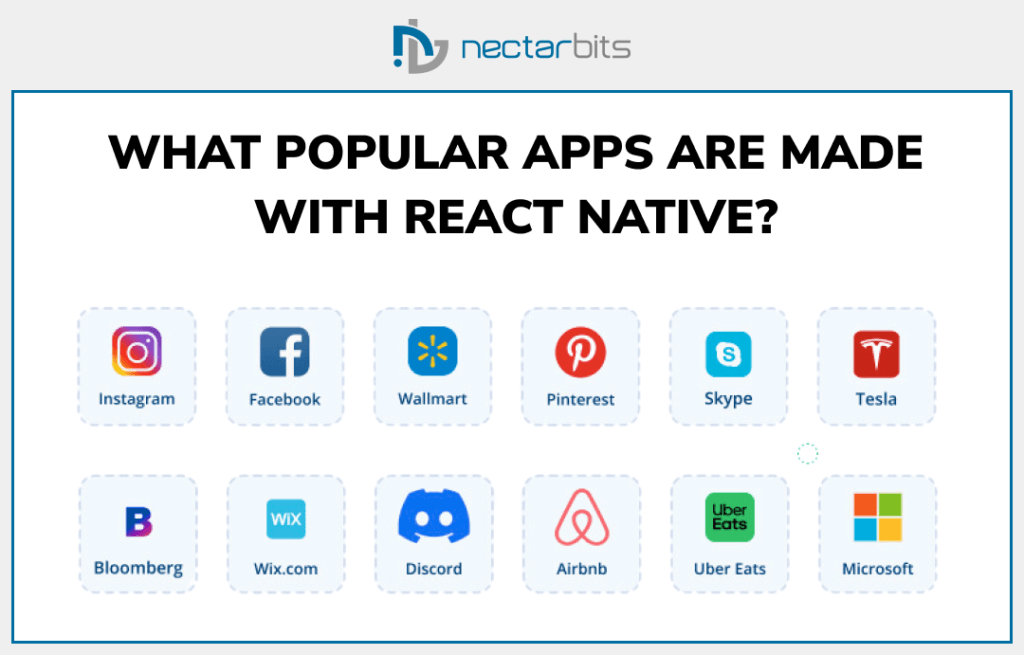
Moreover, the “code once, use it everywhere” approach enables developers to code once and port it to different platforms, which means apps for various platforms are built and published within the development time and cost of one app.
Get Impressive Community Support
React Native app development services are a community-driven technology with over 2,000 contributors on GitHub. Developers can receive feedback, collaborate, and share experiences. The large community assists beginners if they encounter issues or need help. StackOverflow, Codementor, and Reddit are also good platforms for developers seeking assistance.
Integration with Emerging Technologies
One of the best trends in the development of React Native is how easy it is to seamlessly integrate bleeding-edge technologies like AI and ML within its framework. This ensures that developers can create mobile applications that are dynamic and intelligent, with a unique ability to natively support AI functionalities. React Native is capable of hosting AI-driven personalization and ML-based analytics within the mobile application to further enhance user engagement and provide a better beneficial use case for the user.
Fluid integration of such innovative technologies is paramount to keep up with the trend of integrating AI-driven functionalities to improve mobile app functionalities. A recent report suggests that the demand for AI in mobile apps is expected to grow through 2025 in the following manner:-
| Technology | Expected Annual Growth Rate through 2025 |
| AI Integration | 30% |
| ML-Based Analytics | 28% |
The Learning Curve is Easy
Developers who are well-versed in Java programming can easily write React Native programs. The declarative coding style makes the language easy to understand and code. Comprehensive developer-friendly documentation, including code blocks, makes learning React Native accessible even to beginners. Obviously, expertise in the development and knowing common issues is a welcome benefit of professionals that can significantly reduce development costs and time.

The Credibility That Speaks Volumes
The plethora of advantages of React Native app development services increases its appeal. Compared to other frameworks like Flutter, React Native is more popular and reliable in terms of its adoption. This includes mobile applications cdeveloped and used by Fortune 500 companies to SMBs at various levels. Companies like Skype, Instagram, Uber, Tesla, Walmart, Gyroscope, and Salesforce are among the many that have adopted React Native.
Read More:- Comparing Flutter VS React Native in 2024
Efficiency Gains and Better Performance
The efficiency of React Native continues to serve as an important factor in the framework gaining popularity. With regular updates and the introduction of new tools like the Fabric rendering system, the framework has managed to improve its performance significantly. Fabric, in particular, allows for more efficient management of React Native’s UI elements and provides support to handle complex animations easily and fluidly. Moreover, research shows that apps built on the new React Native platform load significantly faster now due to the performance boost observed by the new updates and improvements.
Hourly Rates of React Native Developers
Below are the average hourly rates of React Native Developers on Hire, fragmented according to their geographical regions:-
| Geographical Location | Hourly Rate (USD) |
| North America | $100 – $150 |
| Western Europe | $60 – $120 |
| Eastern Europe | $40 – $75 |
| Latin America | $30 – $60 |
| South Asia | $20 – $45 |
| Southeast Asia | $20 – $40 |
| Africa | $20 – $40 |
Why Developers Should Avoid React Native for Mobile App Development?
When You Need Complex UI
Resource-intensive apps requiring complex gestures, heavy interactions, screen transitions, and animations may find React Native a poor choice. While there is a gesture responder system in React Native to handle screens that require complex gestures, the wide difference in iOS and Android touch subsystems creates issues for developers as they have to work with a unified API.
Integrating Native Features is Tricky
Apps that need native features like media players, cameras, battery monitors, and antivirus functionalities may find building utility features challenging in React Native. While native wrappers for APIs are available to facilitate utility features, the process consumes more time and effort than native app development.
Underperforming in Handling Native App Complexity
While many Android-specific or iOS-specific apps perform brilliantly on their respective platforms, they often need to be published on other platforms. This is because no cross-platform tool, including React Native, can handle the complexity and match the performance that native app development offers. Compared side-by-side, native app development regularly outpaces React Native in terms of performance.
Certain Elements of the Same App Perform Differently on Two Platforms
iOS and Android are two different platforms, and cross-platform apps can behave differently on each. Issues like content cutting, shadow cut-offs, overflow, and resolution problems are common. These inconsistencies can negatively impact a business’s credibility.
Diagnosing Bugs in the Abstraction Layer is a Daunting Task
The abstraction layer in React Native does an excellent job of bridging the rendering APIs on Android and iOS. However, finding and fixing bugs in the abstraction layer is a daunting task, even for the best developers. Additionally, reliance on third-party libraries further complicates ensuring that the framework is up-to-date and ready for greater integration. Therefore, you must hire a dedicated quality assurance team to ensure better software reliability.
Coupling Third-Party Libraries and APIs is Difficult
In specific cases, downloading third-party resources and libraries is crucial to building certain functionalities in the app. This is common in React Native app development, increasing dependency on third-party libraries and APIs, which can take control away from the developers. Frequent updates to React Native can make the integration of third-party resources and libraries outdated, doubling the developer’s workload.
Testing is Not Hassle-Free
App developers use React Native app development services to market the software on various platforms quickly. However, they should reconsider this approach due to the testing and debugging issues that may arise. Beginners may struggle with utilizing Chrome debugger’s features for element property editing. Although React Native’s in-built code inspector is a solution, it’s not always adequate.
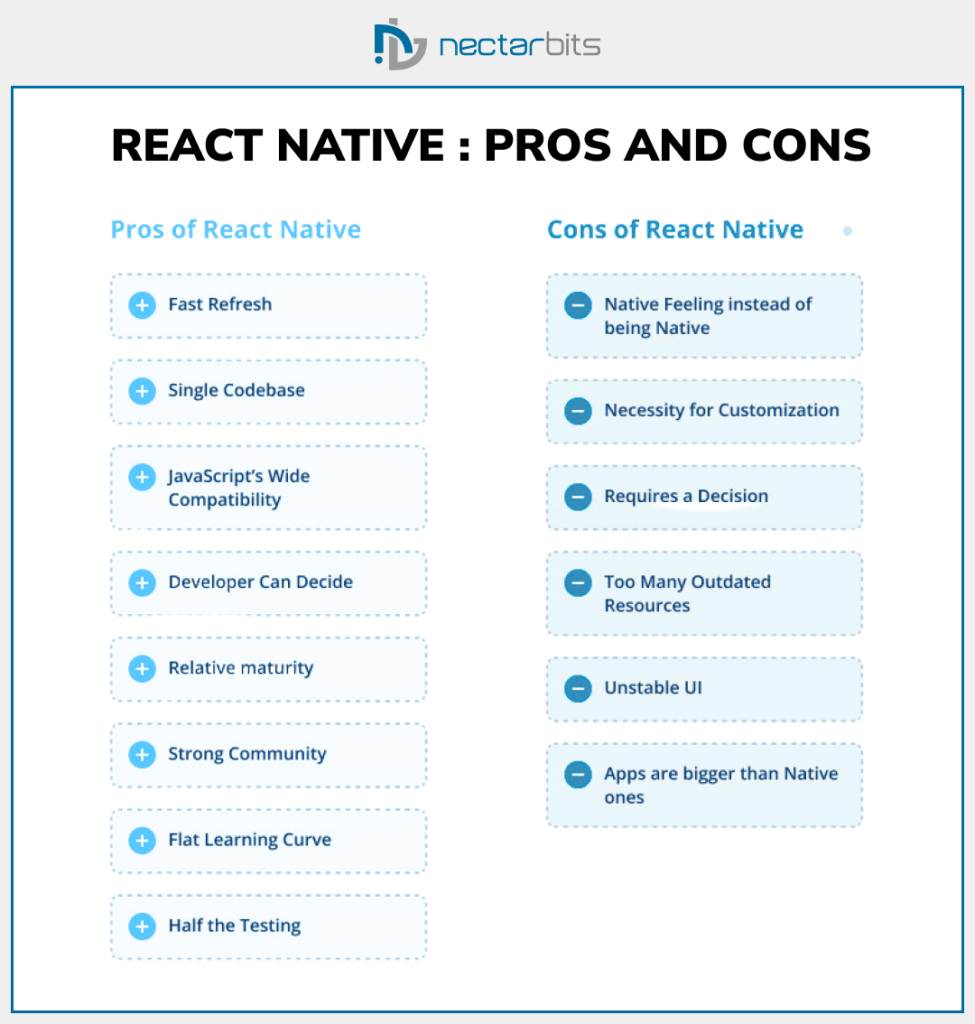
Conclusion
Ultimately, while React Native suffers some minor limitations, it presents a compelling option overall for excellent mobile app development through its ability to streamline development across a wide variety of platforms, delivering exceptional performance and a growing library of pre-built components and widgets that help accelerate the development process of the entire application. Enhancing its appeal for businesses, it provides cross-platform functionality that further heightens its use case across software development.
Whether it is handling complex UIs, integration features, or dealing with platform inconsistencies, the widely popular framework has a solution ready for the most common issues facing other frameworks. With brands like Walmart and Tesla trusting the React Native framework to create their own applications, the decision to use React Native for your next project should be an informed one based on a careful assessment of both the benefits and the drawbacks mentioned in the React Native app development guide above.
Frequently Asked Questions (FAQs)
- What is React Native, and why should I choose it for app development?
React Native is an open-source framework by Facebook that allows developers to build high-quality mobile apps for both iOS and Android platforms. Its cross-platform capabilities make it a cost-effective and efficient choice for businesses looking to publish apps on multiple platforms without duplicating efforts.
Benefits:
- Single codebase for multiple platforms
- Cost-effective development
- Rapid deployment with pre-built components
- How does React Native compare to native app development?
While native apps often outperform in terms of speed and specific platform optimizations, React Native offers a balance between performance and efficiency. It enables faster development cycles and reduces costs by allowing developers to use a single codebase across different platforms.
Considerations:
- Slight performance trade-offs for complex features
- Faster time-to-market
- Lower development costs
- What is the cost of React Native mobile development?
The cost of react native mobile app development varies depending on the complexity of the app, the developer’s location, and the required features. On average, hourly rates for developers range from $20 to $150, depending on the region.
Cost Factors:
- Complexity of features
- Developer experience and location
- Integration with third-party APIs
- How does React Native handle complex UI and animations?
React Native is capable of handling complex UIs and animations, though it may require optimization with native code for the best performance. Tools like the Fabric rendering system help manage UI elements more efficiently, making it suitable for apps with demanding visual requirements.
Optimization Techniques:
- Use of native code for specific features
- Implementing Fabric for Better Performance
- Leveraging third-party libraries
- Why should I hire a React Native app developer?
Hiring a React Native app developer ensures that your app is built efficiently with expertise in cross-platform development. A skilled developer can navigate the complexities of the framework, optimize performance, and integrate advanced technologies like AI and ML.
Advantages of Hiring:
- Expertise in cross-platform development
- Faster development and deployment
- Ability to handle integration with emerging tech


